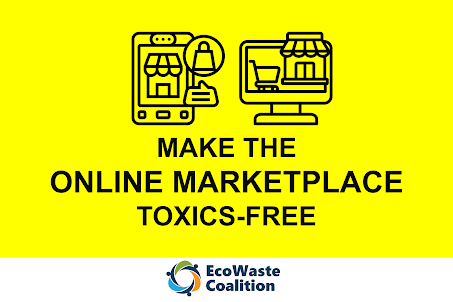EcoWaste Coalition Exposes Online Sale of Controlled Hazardous Chemicals
As the 9.9 online shopping sales get underway, the toxics watchdog group has expressed concern over the sale of controlled hazardous chemicals by wholesalers and retailers in e-commerce platforms.
In the monitoring it conducted today, the group found several listings for substances belonging to the government’s Priority Chemicals List (PCL). The PCL includes chemicals and chemical compounds that “potentially pose unreasonable risk to public health, workplace, and the environment” as determined by the Department of Environment and Natural Resources – Environmental Management Bureau (DENR-EMB).
Some of the PCL-listed chemicals sold online include mercury (a potent neurotoxin), cyanide (one of the fastest acting lethal poisons and is highly toxic for humans and aquatic life), chloroform (a probable carcinogen in humans and is also used in criminal activities), and cadmium (a known human carcinogen and renal toxin)
For example, the group found a listing for liquid mercury with “gold refining” as intended use in violation of Executive Order No. 79, series of 2012, which banned mercury use in mining and mineral processing.
The group also found a very odd listing for mercury as an antidote against witchcraft, which can also be planted on the skin. The listing says “asogi pangontra sa kulam, barang at iba pa; pwede din itanim sa balat.”
One dealer sells sodium cyanide, which, according to the seller, is “used commercially for fumigation,” among other uses. DENR Administrative Order 39, series of 1997, or the Chemical Control Order (CCO) for cyanide does not include “fumigation” among the allowable industrial uses for this highly toxic chemical such as electroplating, mining, steel production, chemical and plastic manufacturing, and jewelry making.
PCL-listed chemicals have been assessed for their toxicity, including acute lethality (the ability to cause death or serious damage), chronic or sub-lethal toxicity, teratogenicity (the ability to cause birth defects or developmental malformations), carcinogenicity (the ability to induce cancer), persistence, and tendency to bioaccumulate in the food chain.
Among other requirements, importers-distributors, importers-manufacturers, and manufacturers-users of PCL-listed chemicals are required to apply for a PCL Compliance Certificate through the EMB’s Online Permitting and Monitoring System (OPMS).
To protect public health and the environment and in line with the Joint Administrative Order No. 22-01, series of 2022 (Guidelines for Online Businesses), the EcoWaste Coalition has put forward the following recommendations:
1. For e-commerce sites to take action against posting for sale of toxic substances, as well as hazardous wastes;
2. For e-commerce sites to require authorized dealers of PCL-listed chemicals to post their registered names, business addresses and copies of their PCL Compliance Certificate; and
3. For authorized sellers to require buyers to provide proof of business registration and permit to use PCL-listed chemicals to prevent misuse and reduce harm to health and environmental pollution.
The toxics watchdog group likewise urged regulatory bodies to closely monitor and stop the online sale of prohibited products containing PCL-listed substances, including mercury-containing skin whitening cosmetics and medical devices, lead-containing paints and similar surface coatings, silver jewelry cleaners containing cyanide, etc.
It likewise appealed to the authorities to check on the sale of household pesticides and agricultural pesticides in online shopping sites, noting that some of the products sold may lack the required product registration and adequate description, and may cause harm to humans and the ecosystems, including marine life.
- end-
Reference:
https://chemical.emb.gov.ph/?
https://ecommerce.dti.gov.ph/






Comments